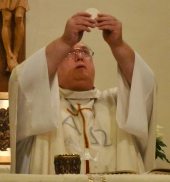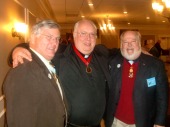
The question about art, music and poetry in heaven is more complicated than we might initially acknowledge. These three efforts at creativity can either be directed to the bottom feeders or they can target the heights of inspiration and hope. There is a vast difference between pornography and the human forms that speak of God’s creation and salvation history in the Sistine Chapel. There is no comparison between a vulgar rap song that espouses violence and sexism to a sweet solo of Ave Maria or a full chorus and orchestra giving us Faure’s Requiem or Handel’s Messiah. There is an infinite distance between simple rhymes for children or off-color limericks for dirty old men and Milton’s Paradise Lost, Dante’s The Divine Comedy or Thompson’s The Hound of Heaven.
Believe it or not, I have heard arguments for music in hell. Indeed, certain authorities intimate that the devil or Lucifer had a certain charge over music in heaven. If so, this explains something of the terrible depth of his fall from grace. It might be discordant, but the arts can both reveal and conceal. I suspect that in hell they do the latter. A fumbling king might imagine he has real greatness if only the trumpets blow and the fanfare is exalted enough. Art can give us a counterfeit beauty, as a mask to cover the ugliness around us. An intricate and moving poem can give a sense of mystery and importance, even to the mundane or hollow.
By contrast, what could an artist in heaven possibly paint that could better express the transcendent than the God and heaven that surrounds him. His picture would be a poor copy. The only true artist in heaven is God. He has painted a masterpiece with the blood of the Lamb. We are all a part of his great work and yet when one steps back from the depiction of all our faces, only one face is seen, the face of Jesus, God’s Son.
We speak of the Eucharist as a foretaste from the heavenly banquet. I suspect that the best and most solemn hymns also grant us a tiny sampling from the heavenly choir. There is something in the soul that vaguely remembers music from before the fall. A note here, a piece of melody there, and suddenly we are conveyed to another plateau of existence. The celestial choir eternally sings the praises of God. While on earth music can raise our hearts and voices to God; in heaven, we are already there— music can only express this abiding presence and the truth that we are made for God and must give him the glory. Singing God’s praises in heaven might be like breathing on earth.
As for poetry, the greatest works seek to crack open the mysteries of God— to apprehend a fleeting truth. Poetry and music are kindred threads. The mystery they target is realized in heaven, but when it comes to the kingdom it has swallowed us up— filled us— transformed us. God is the poet in heaven and we have become his poem. All poetry in heaven is love poetry. God takes the initiative because he loved us first. We are called to the marriage banquet of the Lamb.
“My lover speaks and says to me, ‘Arise, my friend, my beautiful one, and come! For see, the winter is past, the rains are over and gone. The flowers appear on the earth, the time of pruning the vines has come, and the song of the turtledove is heard in our land. The fig tree puts forth its figs, and the vines, in bloom, give forth fragrance. Arise, my friend, my beautiful one, and come! My dove in the clefts of the rock, in the secret recesses of the cliff, Let me see your face, let me hear your voice, For your voice is sweet, and your face is lovely’” (Song of Songs 2:10-14).
Filed under: Catholic, Eschatology, Heaven, Hell, Jesus, Redemption, Religion |















































I enjoyed reading that. Thank you for posting it, Father Joe. Have a wonderful thanksgiving.
Albert